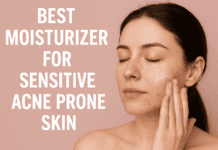Sensitive skin is a term used to describe skin that reacts more intensely than normal skin to various stimuli, leading to discomfort and irritation. Individuals with sensitive skin often experience symptoms such as redness, burning, and tingling.
These reactions may result from external factors or underlying skin conditions, distinguishing sensitive skin from normal skin types. It is essential to recognize that sensitive skin can be a temporary condition or a chronic issue, affecting individuals of all ages, genders, and ethnic backgrounds.
The prevalence of sensitive skin is notable; statistics suggest that a significant portion of the population experiences some degree of skin sensitivity.
Certain demographic groups, such as people with fair skin or those suffering from conditions like eczema and rosacea, may be more prone to sensitive skin. Understanding these demographics can help in identifying personalized skincare routines for those affected.
Common triggers for sensitive skin include environmental factors, allergenic substances, and harsh skincare products. For instance, exposure to extreme weather conditions, particularly cold winds or excess heat, can exacerbate skin sensitivity.
Certain ingredients often found in skincare products—such as alcohol, fragrances, and preservatives—may lead to irritation. Therefore, it is vital for individuals with sensitive skin to be mindful of product formulations and environmental influences.
A comprehensive approach to managing sensitive skin requires awareness of individual sensitivities. Conducting patch tests before introducing new products into one’s skincare routine is critical in determining how the skin will react.
Adopting a gentle skincare routine can significantly enhance skin health. This includes selecting products formulated for sensitive skin, which typically contain fewer irritants and are designed to soothe rather than aggravate.
External factors such as diet and stress also merit consideration as they can contribute to skin sensitivity, highlighting the importance of a holistic approach to skincare.
Key Ingredients to Look For
When selecting skincare products for sensitive skin, it is crucial to pay attention to the ingredients listed on the label. Certain components can significantly benefit individuals with sensitive skin by soothing irritation and fortifying the skin barrier.
One of the most effective ingredients for sensitive skin is aloe vera. Known for its hydrating and calming properties, aloe vera helps to reduce redness and provides relief from skin discomfort. Utilizing products with this ingredient can also facilitate a healing environment for the skin.
Another vital ingredient to consider is chamomile. Chamomile is renowned for its anti-inflammatory properties, making it an excellent choice for those with sensitive skin. It helps to soothe the skin, relieve stress reactions, and promote overall comfort. Products containing chamomile can help calm irritated skin and provide a gentle refresh without causing further agitation.
Hyaluronic acid also merits attention, as it aids in maintaining skin hydration. This naturally occurring substance can hold several times its weight in water, making it a potent humectant.
By drawing moisture into the skin, hyaluronic acid assists in preserving the skin’s elasticity and appearance, which is vital for maintaining a healthy complexion.
On the other hand, it is equally important to be aware of harmful ingredients to avoid. Many products contain fragrances, which can trigger allergic reactions or exacerbate irritation in sensitive skin types.
Additionally, alcohols and sulfates can strip natural oils, leading to further sensitivity and discomfort. Reading product labels is essential; seek out formulations that emphasize gentle, hypoallergenic, and non-irritating ingredients to ensure safety and efficacy. Opting for products with minimal, recognizable ingredients can help to cultivate healthier skin for those with sensitivities.
Top Recommended Products
Choosing the right skincare products for sensitive skin can be challenging due to the increased likelihood of irritation and reactions. Below is a selection of top recommended products, each carefully formulated to cater to the needs of sensitive skin.
CeraVe Hydrating Facial Cleanser
One standout option is the CeraVe Hydrating Facial Cleanser. This cleanser is known for its gentle formulation that includes ceramides and hyaluronic acid, which help to restore and maintain the skin’s natural barrier.
No products found.
It effectively removes dirt and makeup without stripping moisture, making it ideal for sensitive complexions. Priced around $15, it is both effective and budget-friendly.
La Roche-Posay Toleriane
For moisturizing needs, consider the La Roche-Posay Toleriane Double Repair Face Moisturizer. This product is renowned for its soothing properties and is infused with prebiotic thermal water and ceramides.
No products found.
It provides 48-hour hydration and strengthens the skin’s moisture barrier. Priced at approximately $20, it has garnered positive reviews from users who note its lightweight texture and effectiveness in calming irritated skin.
EltaMD UV Clear Broad-Spectrum SPF 46
For those seeking an effective sunscreen, the EltaMD UV Clear Broad-Spectrum SPF 46 is highly recommended. This lightweight, oil-free sunscreen is formulated with niacinamide, which helps to soothe and promote the appearance of healthy skin, making it a favorite among dermatologists.
No products found.
It retails at around $39 and is particularly beneficial for sensitive and acne-prone skin.
Paula’s Choice CALM Redness Relief Serum
The Paula’s Choice CALM Redness Relief Serum is an excellent option for addressing redness and sensitivity. This serum contains calming ingredients such as chamomile and antioxidants that provide relief from irritation.
No products found.
Priced at about $39, it has received high praise from customers for its ability to enhance skin tone and reduce sensitivity.
These products underline the importance of choosing formulations specifically designed for sensitive skin. They not only address individual skincare concerns but also prioritize the delicate balance required for sensitive complexions.
Building a Skincare Routine for Sensitive Skin
Creating an effective skincare routine for sensitive skin requires a careful selection of products and an understanding of your skin’s needs. The primary steps in this routine are cleansing, moisturizing, and sun protection. Gentle cleansing is crucial; look for mild, soap-free cleansers that do not strip the skin of its natural oils.
Recommended frequency for cleansing is typically twice daily, but for sensitive skin, it may be beneficial to cleanse only once if irritation occurs.
Moisturizing is the next essential step. Opt for fragrance-free and hypoallergenic moisturizers designed for sensitive skin. Ingredients like ceramides, hyaluronic acid, and glycerin are excellent choices, as they contribute to hydration without causing irritation.
It is advisable to apply moisturizers after cleansing to lock in moisture effectively. Depending on individual skin needs, moisturizing may be done once or twice daily.
Sun protection is critical for all skin types, especially sensitive skin. A broad-spectrum sunscreen with an SPF of 30 or higher should be applied daily, even on cloudy days. Look for mineral-based sunscreens that contain zinc oxide or titanium dioxide, which are generally well-tolerated by sensitive skin.
When introducing new products into your routine, patch testing is paramount. Apply a small amount of the product on a discreet skin area and observe for 24 to 48 hours to check for any adverse reactions.
Transitioning into new products should be done gradually; introduce one new item at a time and monitor how your skin responds before adding another.
Adequate hydration and effective stress management can further support skin health. Drinking plenty of water and maintaining a balanced diet rich in antioxidants can enhance overall skin condition.
Additionally, integrating stress-relief techniques, such as mindfulness or yoga, can positively impact skin health by reducing flare-ups related to stress. Following these guidelines will assist in building a skincare routine that not only addresses the unique needs of sensitive skin but also promotes a calm and balanced complexion.







